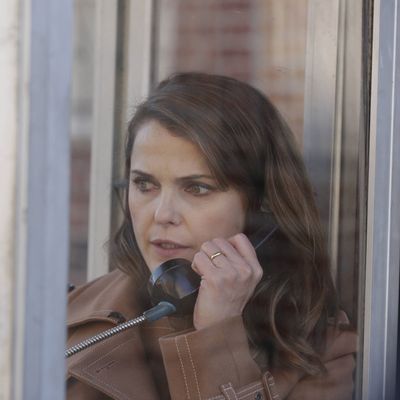
What does it mean to be an American?
Of all the big questions that propel The Americans, this one remains the most interesting, even though it’s rarely deployed on an episode-to-episode basis. The schism between cowboy-boot-and-Camaro-loving Philip and the more strident Elizabeth has played out around the edges of this show for some time, usually as a means to highlight the main action. But those highlights get the spotlight this week: From its cumbersome title on down, “The Magic of David Copperfield V: The Statue of Liberty Disappears” is fixated on the symbols and perceptions of Americanness — and consequently delivers the best episode of the season, one that re-centers the series at just the right moment.
But first, we must bid good-bye to Poor Martha. That near-wordless pre-credits sequence — well-directed by Matthew Rhys, in his first venture behind the camera for The Americans — is a beaut, full of smart little details that set the stage for what’s to come. Witness the way Martha stares at a jar of peanut butter over a silent breakfast, as her internal monologue (“Do they have peanut butter in Russia? Is this my last time eating peanut butter?”) plays out over her face. There’s a tragic irony to Philip, a man who’ll likely never return to his homeland, sending an American to an unknown fate in a country he hasn’t lived in for decades. Neither of them truly know what will become of Martha when she reaches Russia: Will she be “hailed as a hero,” as Philip promised, cared for and taught Russian and given the tools to make a new life? Or will she be a victim of the destabilization and dissent we’ve been getting hints at all season? We may eventually find out — The Americans could give us a “Martha’s adventures in Russia” side plot, similar to Nina’s — but the way this episode leaves it, with Martha’s tiny plane flying into the inky black night, it feel like she’s heading to a terminus, the end of life as she knows it.
It’s sort of the end of Philip’s life as he knows it, as well — or at least life as it’s been since he took off Clark’s wig and revealed himself to Martha. Martha was his most time-consuming “agent” by far, and this season, Philip’s story has revolved primarily around her. Now that she’s out of his hands, he has time to wallow … and boy does he wallow. It’s been easy to sympathize with Philip’s traumatized air this season, but divorced from the urgency of Martha’s plight, his behavior takes on a different, more annoying tenor. Suddenly, we’re put in Elizabeth’s shoes, realizing the extent to which she’s attempted to support her husband during this time, and how truly difficult that’s been.
Elizabeth has been somewhat less present this season, by virtue of the Martha story line being such a focal point. At first I thought this might just be an effect of the show hiding Keri Russell’s pregnancy, but now I realize The Americans has been methodically laying the groundwork for this explosive midpoint. This episode is a showcase for Russell — perhaps that’s why her partner Rhys chose to direct it — allowing the actress to show off this complex character she’s developed over the last three-and-a-half seasons.
Russell gets a couple of explosive, scenery-chewing scenes with Rhys and Holly Taylor, delivering big both times. (This episode will be remembered as the one where we got to know the pulsating rage-vein in her eye.) But it’s almost more interesting to see her navigate the lead-up to those moments, where Elizabeth is trying to understand and accommodate her family’s behavior, but can’t quite hide her true feelings. She inquires about Martha, giving her husband ample opportunity to talk to her, but then storms off in a huff when he rebuffs her. She spouts platitudes about Martha being a nice woman — but she also calls her “simple,” in a passive-aggressive slip that Philip does not let go by. She goes to EST, seeking to understand this strange group that has has such a hold on Philip and admits that she can see what he gets out of it — but she’s not just going to leave it there. Elizabeth is many things, both good and bad, but there is one thing she is most certainly not, and it’s that one thing that ignites the fuse between her and Philip.
“I just think it’s very American, the whole thing,” Elizabeth says of EST, with just enough derision to put Philip on the offensive. This “American” idea of being a slave to your feelings, to your moods — and allowing others to capitalize on it — informs Elizabeth’s blowups with both Philip and Paige, who have both displayed a lot of woe-is-me emotional narcissism lately. “I can’t control what I feel,” Paige protests a few scenes later, when Elizabeth berates her for missing an “appointment” with Pastor Tim and Alice. “You can control what you do,” Elizabeth spits back, sans a single iota of sympathy for her daughter’s “precious” moods. Elizabeth has suffered, has done horrible things, and has hurt people she loves — she raises the specter of Gregory during her showdown with Philip — but she’s never lost the battle-hardened fortitude that allows her to keep doing her job. She’s Russian, dammit, and she has no sympathy for soft American sentiment.
But this is The Americans, so of course it’s not that simple. Once again, EST gives us some thematic underlining in the form of the speech Elizabeth hears: “You love the prison you’ve made for yourself.” Elizabeth has always depended on her mission, on her beliefs, on her Russianness to keep her going through one hardship after another — but would she have such hardships without her mission, without her beliefs? It’s an idea she doesn’t want to consider, but we nonetheless see it play out when she’s forced to kill her agent, Lisa, who’s threatening to go to the police about smuggling information from Northrop. Elizabeth is a survivor and expects others to display the same strength she does — but that doesn’t mean she’s free from the pain and suffering that afflict her husband and daughter. Even the good things in her life, like her burgeoning friendship with Young Hee, are tainted by her work. Likable as she is, Young Hee is an “agent” just like Lisa was, and Elizabeth could eventually be forced to take similar measures against her.
That do-what-you-gotta-do stance is a wartime mentality, something Gabriel expounds on during his conversation with Claudia. At first, Gabriel seems almost disgusted with the lack of fortitude displayed by his charges, remembering that in his day, “We did what we had to do, that’s the way it was or we got killed ourselves.” But it’s Claudia, of all people, who reminds him that the old ways don’t apply so easily to the new status quo. No one seems to know what’s going on; no one has any power to change it. And without answers, unwavering dedication to a cause is a much bigger demand.
A few scenes later, Gabriel is the one to free Philip and Elizabeth from the prison they’ve made for themselves, in the form of a “vacation” — no new missions, just maintaining their current ones with Kimmy and Young Hee. They return home, where David Copperfield is providing a helpful thematic summary in the form of his speech about disappearing the Statue of Liberty: “I could show with magic how we take our freedom for granted. Sometimes we don’t realize how important something is until it’s gone.” Cut to the Jennings family, gathered together in one room for the first time in forever, the very model of an American family.
And then … a time-jump! The seven-months-later reveal is a brilliant bit of narrative calibration, one that provides a much-needed release of pressure for this almost unbearably tense season, and re-establishes this show’s central concept: The Jenningses once again appear to be a model American family unit. But the parents (and now one of the kids) have a secret, which they must protect at all costs. They look, act, and even feel like Americans, but they’re not quite the real deal. As this episode makes clear, they’re not 100 percent Russian, either.
While these scenes of the Jenningses’ new status quo play out, Gaad warns Stan, “You can’t lose sight of who these people are.” It’s a nice, strong sentiment for the character in what’s likely his final appearance (we’ll miss you, John-Boy!), but it also raises the question: Who exactly are these people, and what exactly are they capable of? At this point, I’m not sure even they know.


